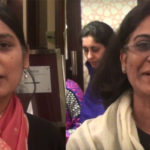On Tuesday, 7th February 2017, Centre for Social Research organized a Press Conference regarding the passage of Women’s Reservation Bill in Lok Sabha. As part of the National Alliance for Women’s Reservation Bill, along with various other organizations, Centre for Social Research has been actively pursuing the passage of the WRB in the Lok Sabha. The WRB was passed by the Upper House (Rajya Sabha) of Parliament on 9th March 2010, but for it to be converted into an act, it must be passed by the Lok Sabha and signed by the Honourable President.
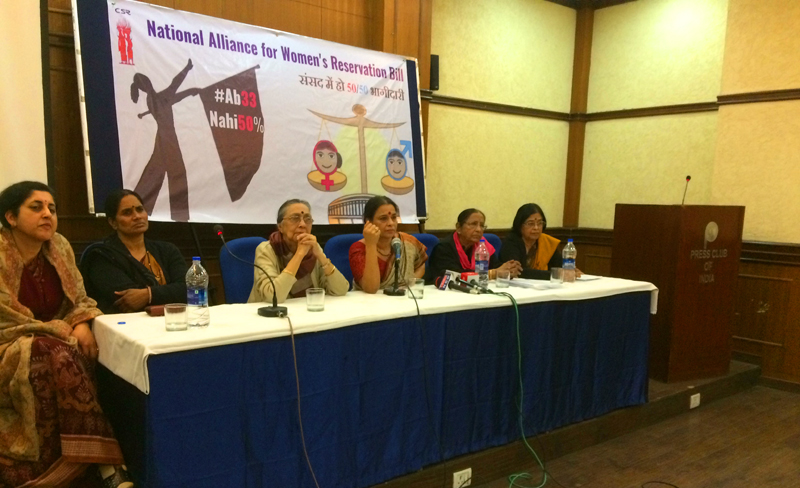

Various organizations are a part of the NAWRB- AIDMAM (All India Dalit Mahila Morcha), AIDWA (All India Democratic Women’s Alliance), AIWC (All India Women’s Conference), Caritas India, CBCI (Catholic Bishops’ Conference of India), Conference of Religious India, Guild for Service, Jagori, Jan Ki Baat, Justice Seekers, JWP (Joint Womens’ Programme), MDS ( Mahila Dakshta Samiti), NFIW (National Federation of Indian Women), Oxfam India, Pink and Blue Foundation, Rashtriya Dalit Mahila Andolan, Saahas, Swastik Mahila Samiti, Vivat International, WPC (Women Power Connect) and YWCA of India (Young Women’s Christian Association of India).
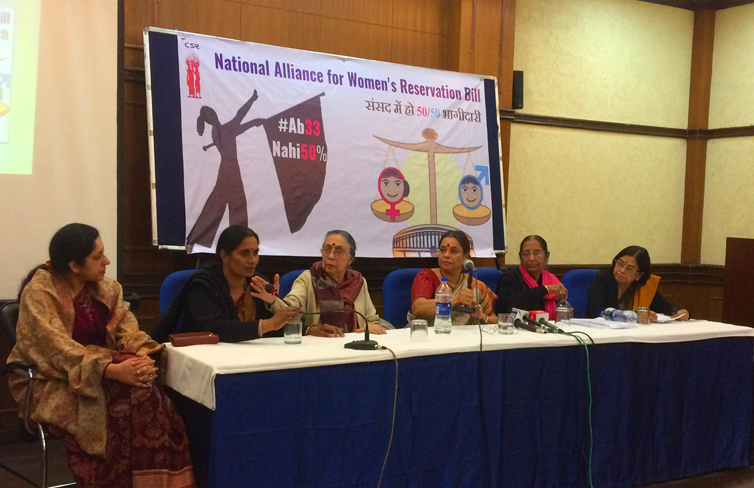

In our view, women reaching positions of power, are blocked by patriarchal mindset and double standards. We feel that women must unite to demand action on the WRB, which is the longest pending bill in the history of Independent India for last 21 years. The global average of women in parliament is 22.40%, and India ranks 103rd place out of 140 countries, with a 12% representation of women in Parliament. The figure is even lower for State Assemblies, with 9% of female representation.
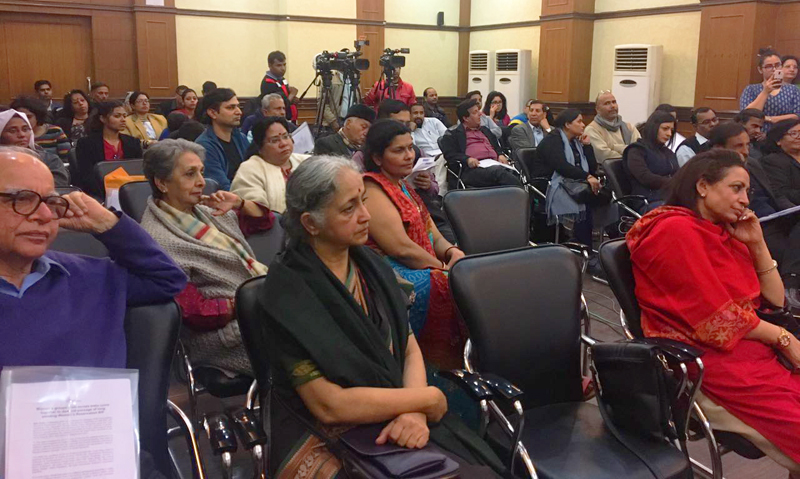

The press conference, held at Press Club of India, began with a short panel discussion, comprising of eminent personalities. First up, our director, Dr Ranjana Kumari, Director of Centre for Social Research gave the following statement : “National Alliance for Women’s Reservation Bill has been fighting for WRB since 1996, and it is unfortunate that we still keep fighting for this. The place for women in the political sphere is non-existential. Even after reservation, the women cannot raise their voice due to the male party. No matter who is in power, regardless of political party, the position of women is an absolute zero. The women are referred to as only “tainted and painted” and their usefulness is limited to only good speeches. They are both literally and figuratively the “gungi guriya”. The women are only for welcome and pujas but no finance, domestic or foreign affairs talks are taken up by them. This conference is to raise a voice against this injustice. This is a social injustice, and to solve this we need to break open the temple of democracy, the Indian parliament. Till date nobody has raised their voice for this issue. Women have closed their eyes and the media is fatigued. However, the request is not to get fatigued and to fight the battle. It is no charity we ask for, it is our right.”
Dr. Jyotsna Chatterjee, Director and Secretary, Joint Women’s Programme, said “I wish more people were present here, because women participation in the government and decision making is a social issue. The constitution ensures equality of men and women but falls short of doing so because men have failed to do it. This is a political issue based on the Constitution of India. We want the government to give at least 33% reservation, however our demand shall always be 50%. It is the public which should stand with us. I re-emphasize that this is not just a women’s issue but a social issue and hence needs our solidarity and support.”
Mrs. Asha Singh, from Nirbhaya Foundation, said “We ask for 50% reservation, however it should be visible first. We need to be united for the same. We need to break open our restrictions to come together and then continue to fight the battle. We should organize demonstrations, and regularly pursue this, and not restrict it to a mere conference. Every five years, the political parties take up the women’s issues in their manifestos and then they completely forget about it. Hence we need to organize a consistent movement against this, to fight for justice.”
Ms Maimoona Abbas Molla, Delhi President AIDWA said, “I support that a movement needs to be organized. All the election manifestos have this, but they do nothing beyond that. We have grown old but nothing happened. We all saw the sweeping changes, a people’s movement can make in Haryana and Gujarat. The world has changed and nothing happens with a press conference; the women are mere puppets.”
Dr Anjali Mehta said “I just have four points to make in this discussion”.
- Reservation as a set target needs to be achieved at all cost.
- We need to see the effect of this, in this generation only. We have elected the government now and hence we demand this now.
- We need to see the true intentions of the government. We should have both power and money in our hands to help us climb the ladder of empowerment. Thus we need gender budgeting simultaneously with reservation.
- Gender Justice is now a reality. Canada, Brazil, United Kingdom has a huge predominance of women in politics but India still falls behind in this issue. If India needs a global presence, it needs to pass the Women’s Reservation Bill.
Finally, Dr Kumari closed the panel discussion with the following statement “Women have polled more than the men but only 2% seats are available to them. They have a greater probability to win according to the statistics then why are they denied a ticket? Women should have a role in the politics because that is the only way they’ll gain social power. However the women in the parliament are dumbfounded with no political or financial power whatsoever. Such a bill is no charity that we ask for, but this bill should be passed with millions clapping for it.”
This discussion was immediately followed by the question and answer session, wherein members of the press posed various questions regarding the passage of the WRB to the panelists. Some of these are as follows:
Q. Considering there are so many pending bills, for the functioning of the parliament, don’t you think that 33% is too high a reservation? Don’t you think it’ll deprive men?
A. This isn’t about pending bills; and even if one might consider that argument, then you must know that the Women’s Reservation Bill is one of the longest pending bills in India. It was passed by the Rajya Sabha but not by the Lok Sabha. This is about gender justice. Women comprise of half the population, and if such a bill is kept pending, it is injustice. If you think that 33% is too high, you must understand that 88% is reserved for men. In the year 1947, only 3% of political space was occupied by women, and today we have reached 33%, if we have to reach a point of equality, it will take us 700 years.
Q. Instead of reservation, why don’t women get inclusive entry into politics through tickets via political parties?
A. We are talking about equality here not about tickets from parties. In the recent elections in the four states, AAP gave 4% of the tickets to women; which means 96% is given to men. This means that when only men are given preference, men will only win.
Q. Women in the political arena face problems in the electoral process, face challenges that have led them to demand for reservation. What are your comments?
A. Majority of the political parties do not have more than 4% women actively participating in and fighting elections. Women are not allowed by their families to get out of their homes, then there is no space in political parties, and lastly, power is not shared by the men. Only if there is change in perspectives and attitudes, things will change.
Q. How do you move the process in Lok Sabha, especially looking at the condition in Nagaland?
A. We have had a discussion in the high levels about this. The WRB is a live bill, which means that once it is passed by the Rajya Sabha it can be taken by any successive government with a 2/3rd majority. The point of this bill is to give women a ground to fight elections where women will fight women only, so that the winner will also be a woman.
Q. What you’re talking about is in the area of politics, but what about all that happens under the roof?
A. Indian Society doesn’t respect women. Just to give an example of a time when Gandhi went to visit the Queen, and the Queen asked him if he wasn’t feeling cold, Gandhi replied saying you’ve dressed on our behalf (looking at her jewels, and grandeur). Someone has to take responsibility for the actions of others, as long as there is a pledge for change, but the young generation must join us in this struggle. This struggle is a fight against the lack of opportunity and the cultural practices that deprive women from entering politics that is rightfully theirs. This is not a political issue but a social one. This is our right as per the Constitution of India, but we are not allowed our own Rights.
Q. For many years the struggle for the WRB has been on, do you think that the momentum of the movement has lost momentum?
A. We have all voted every time with the hope that this time, maybe this time the bill will get passed. Governments have come and gone with their promises, but none of them have passed the bill. The passage of the bill is not in the hands of the women but only that of the parliamentarians.
Q. Urbanized women will benefit from the WRB but what about women from rural backward classes? All the panelists are all English speaking and upper-class, how do we know that it will benefit the other women in society?
A. It is unfortunate that our official language is in English. But you must know that most of us seated here are from villages but what has brought us up till here is our education. We have never refused or denied any form of engagement from other women. Even if the bill comes with further reservations for women from all backgrounds, we welcome it. Our goal is that we want women to come to power.
Q. What level of engagement do you have with the government?
A. There is an active campaign and team of delegates who have been meeting with the politicians and leaders from the government and opposition, as well as women politicians, but they do not come out in open support because of the fear of the high political authorities. In all parties, there is a diktat so members can’t go against it.
Q. Many states already have reservations in the district/state level and there we have seen that men make their wives contest elections on behalf of the man. What are your suggestions to prevent this?
A. Nitish Kumar had started this 50% reservation in his state and that was replicated in other states. Women have gotten recognition through this. Dynastic Politics has been a trend and when Rahul Gandhi or Akhilesh Yadav are in power, nobody lives in fear but if women get in to power then there is such a problem and fear amongst people. We hope that time will bring about the wanted change.
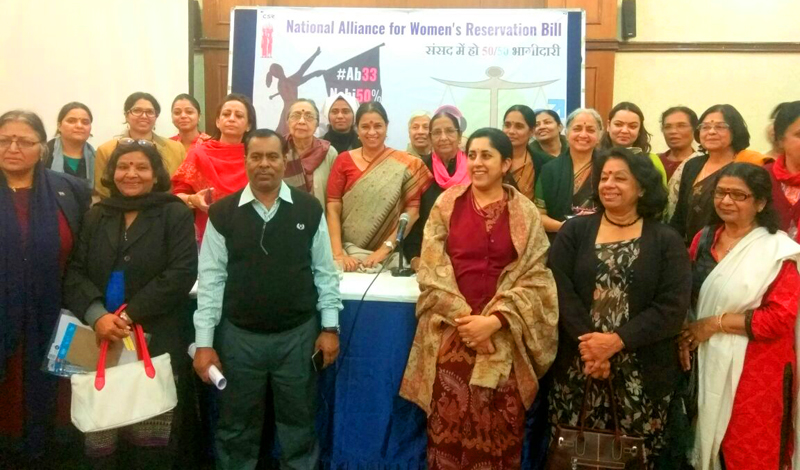

The press conference was a resounding success, and was covered by many Hindi and English newspapers. You can read them here:
2. The News
3. The Quint
4. Daily Hunt
We are very happy to have garnered the support from organizations and press alike, and hope that this movement yields positive results in the next session of the Parliament!
#Ab33Nahi50!
Discuss this article on Facebook



